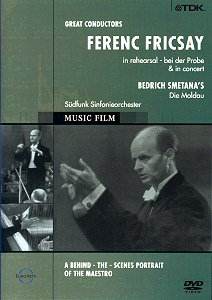A relatively short while ago, I heard a well
known critic, who should have known better, describe Ferenc Fricsay
as an unknown conductor who was only now starting to get his just
recognition on disc. Did he not realize that in the 1950s and
1960s Fricsay vied with both Furtwängler and Karajan as DGG’s
primary conductor? How reputations are lost or dimmed with the
passing years. Full marks to TDK therefore for making this recording
available to us. Full marks also for making available the actual
performance resulting from these sessions.
As is common with this Great Conductors series,
the sound is reasonable broadcast quality mono sound with black
and white pictures. When this film was made in 1960, Fricsay was
only three years away from death, and the sight of the conductor
forcing his weakened body to obey his musical inspiration is most
moving.
He looks to be in very poor health as he rehearses
the orchestra, but quite soon, we forget his physical condition,
so intense is the musical inspiration and concentration from both
conductor and orchestra. One can hear very clearly how the performance
develops from shaky start to confident luxurious playing at the
end of the rehearsal. This time, we also get to hear the performance
in the concert hall and experience the reaction of the audience.
This material has been released before on CD as a bonus disc issued
by DG in their Ferenc Fricsay Portrait series. This was part of
a 10 disc set, no longer available, which cut a swathe though
Fricsay’s favourite composers. I wonder how many of you will remember
his absolutely superb performance of Tchaikovsky’s Pathétique
Symphony, long a first choice in the catalogue.
Fricsay, Hungarian by birth, spent most of his
active conducting career in West Germany. He conducted the Berlin
Philharmonic regularly, and was Chief conductor of the RIAS Symphony
Orchestra, Berlin, then to become the Berlin Radio Symphony Orchestra.
His mainstay characteristic was to urge his players to listen
to each other, and to concentrate on a chamber music style of
playing. This becomes clearly evident in the rehearsal. The result
of this was a delicacy in his interpretations and a wonderful
balance within the orchestra. He must have been a recording engineer’s
dream, similar to Sir Adrian Boult, who had a similar outlook
in relation to internal orchestral balances.
He was a superb Mozart conductor and what I find
incredible, given the pace of the period bands’ interpretations,
is the criticism of Fricsay’s Mozart opera performances that the
tempi are generally too fast. One is never satisfied!
His interpretations of the music of his compatriots,
Bartók and Kodaly have long been admired, and it is this
chamber style of playing that brings out the different strands
of the writing so clearly – none of the slow romantic mush which
disfigures many of the modern interpretations of these works.
Back to the current issue – there is a very moving
part of the rehearsal where Fricsay turns to the orchestra and
says "You know gentlemen, it is very good to be alive".
This is almost a cry from the heart of a very passionate interpreter
of Ma Vlast. More please, if there is any more from this
artist, hopefully now better known as a result of this very welcome
release.
John Phillips
